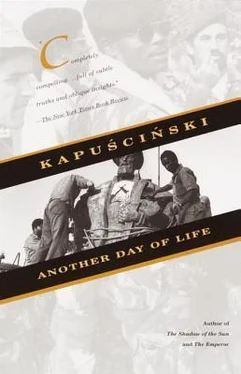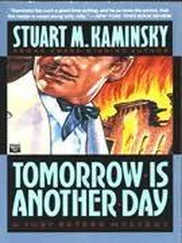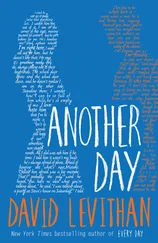“So why are we traveling along a road where there’s a battle?” I asked Manuel.
“Because there’s no other road from Lubango to Benguela,” he replied.
“Well, you’ve got a point there,” I admitted.
Bota took a pull from his bottle and then passed it back to us, so we all got a swig. Things improved. We rode for perhaps half an hour at high speed through hilly terrain with green forests on both sides of us and we had already reached the crossing in Caculi when we heard shooting, the drawn-out thumping of machine guns and the bursting of shells to left and right just off the road. Nelson turned off the lights and slowed down, because the night was very dark; he drove on blind, feeling for the soft shoulder of the road. “Slower,” commanded Bota, who was beginning to sober up. “But perhaps it’s better to go faster,” Manuel said shyly. We drove on like that for centuries. Jesus, I thought, Jesus, a grenade has gone off in the ditch — there was a banging of tin as if someone were hammering on the roof with a club. After a moment Bota asked, “Is everybody okay?” “Yes, we’re okay.” Then, at the last instant, Nelson saw a parked truck and was about to swerve around it, when a mulatto jumped out of the ditch toward him and said, “Nelson, I’ve got twenty people here, but I can’t throw them forward to hold Chipenda, because I’m out of gasoline. Where can I get gasoline?” He was all shivers and it was terribly cold.
“Where will I get you gasoline?” Nelson said. “Go to Lubango.”
“How can I go to Lubango, man, when I don’t have any way to move?”
A series of tracers ripped above us and then a second and a third, and the man who was standing in the road and gripping the door of the car as if he didn’t want to let us go, said, “Nelson, I’m telling you, it’s bad, they’re killing us off like chickens.” Again a grenade nearby, then several at once, and Bota said “Move on” from the bottom of his soused stupefaction. Nelson put it in gear and the mulatto disappeared as suddenly as if he had been struck down, and why were we driving into that horrendous fire instead of sitting it out in the ditch? But they might have thought that the enemy would round us up like stray dogs and that it would be better to try to slip out of the trap, and in any case we turned at Quilengues and along both sides there were walls of earth and we were obviously diving into the bottom of some excavation or gorge, and suddenly running feet and two boys ran out with rifles and Bota said, “Stop them!” and Nelson cried “Halt!” and they stopped. They were just kids, beat-up and half-paralyzed with fear, and I looked at their rifles— they had old Mausers. “Where are you from?” Bota asked. “From Comandante Antonio’s regiment.” “Aha,” Bota says, “you’re running away, eh?” They stood there, humble, frightened, as if teacher had caught them copying during a quiz. Bota ordered, “Return to the battle immediately, and I’ll be there right away to see if you’re fighting, and I’ll remember your faces.” Gray with fear, the faces of these boys withdrew into the darkness and vanished. We drove on and Bota said, “Now it’ll be worse still, because what we’re trying to do is push through to Quilengues and there ought to be mercenaries there.”
Dawn begins and the shooting slowly quiets down and we leave it behind. The sky begins to resemble a meadow and then it looks like a sea and then like a snow-covered plain. “Halt!” says Bota, and Nelson stops the Peugeot on a blind curve. We walk ahead to see what is going on in Quilengues. It is a cold, gray dawn; dew, no sun. We advance on the prowl because no one can tell who is hiding in these houses and who’s around the next streetcorner or the one after that. We walk for a long time to convince ourselves that the town is empty, without a trace of life. I don’t know what happened there before we arrived. There are no people. Nor any other creatures. Not a dog, not a cat. No goats and no chickens. No birds in the trees. Perhaps not even mice.
We had returned calmer to the car when Nelson suddenly stopped, straightened his shoulders, and said, “Another day of life,” because now the road to Benguela was clear, and he began to do calisthenics and we all joined in, Bota unsteadily, staggering continually, leaning to left and right, but we were doing it energetically. Put your hands on your hips, now stand on tiptoe and do a squat, and one and two, straighten your backs, head up, deeper squats, deeper, and now thrust your arms forward and back, harder, harder to the back and exhale, inhale, arms out, don’t let those arms droop, now lean forward and to the side on a three count and one and two and three and now a duck waddle and now jumping jacks and now the sun comes out.
When I returned to Luanda on Saturday morning it was still dark. We had ridden from Benguela in a tanker truck sent at night to the capital to look for gasoline, because the southern front was immobilized by lack of fuel. Along the way we passed drowsy, half-conscious checkpoints and boys wrapped in tarpaulins, in horse blankets, in bedspreads and sacks, since it was drizzling unpleasantly. As usual, discussions broke out among them over whether or not to let us pass, and they wanted us to give them something to eat or smoke, but we had nothing so they waved their hands in resignation and went back to sleep. You could have driven in at night and taken Luanda without a shot. Women in the African suburbs were lighting fires in front of their houses and preparing to grind manioc. Grinding manioc into a hard, crunchy white dough consumes half the lives of African women. The other half is earmarked for carrying and giving birth to children. In some places there were already lines waiting for water at the wells; in others, for bread. The people in these lines snoozed against walls or slept, covered with sheets, on the ground. Glued to the walls were posters reading YOUR COUNTRY NEEDS YOU with a giant black finger pointing at the eyes of passersby, which at that hour were clotted with sleep. In the European city center there was not a sign of life. Dust and cobwebs had overgrown the houses and streets.
I returned to room 47 in the hotel, drove a herd of cockroaches out of the bed, and lay down to sleep. I never dream, but this time I suddenly found myself in the woods outside Warsaw, where hooligans with knives were ducking in and out from behind the bushes, drawing nearer, as if playing hide-and-seek. I opened my eyes to see Dona Cartagina, the thin and exhausted Oscar (now owner of the hotel), and the doorman Fernando — with a plastic medallion bearing the likeness of Agostinho Neto around his neck — standing over me. They were happy that I had returned and, quite pointlessly, kept asking me if I was alive — with such insistence and incredulity that in the end I couldn’t tell if I was awake, or if this was still a dream in which Cartagina, Oscar, and Fernando were suddenly prowling with knives through a grove of trees outside Warsaw. I don’t know what happened next (I probably went back to sleep), because when I got out of bed the room was empty. There was a musty dampness in the air, and the ceiling fan was out of order. I tried turning the faucet. The faucet snorted violently, then silence: no water. I ran downstairs, where Felix was dozing at the reception desk with his elbows folded on heaps of unneeded paper and a stack of valueless money, his pale face reposing motionless and expressionless in his hands. I shook him: “Give me something to drink, Felix!” He opened his eyes and looked at me. “There’s been no water for three days,” he said. “The last wells are running dry. When there’s nothing to drink, the city will have to give up.” I left him and headed for the kitchen, but when I opened the door such a macabre odor assailed my nostrils that my legs grew heavy and I couldn’t take a step. The stench emanated from a mountain of unwashed dishes and pots, but above all from a fetid pig that the black cook was quartering with a cleaver. “Camarada,” I said, leaning on the table to keep from dropping over, “give me water.” He put down the cleaver and gave me a mug of water from a tin barrel. I felt a softness and a chill inside me: I was coming back to life. “Give me some more,” I said. He consented: “Drink as much as it takes for you to feel good, camarada.”
Читать дальше











